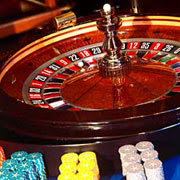 Opponents of a proposed Indian casino in this southeastern Massachusetts town will get a chance to reject any deal the Board of Selectmen make with the Mashpee Wampanoags, according to an opinion by the town's lawyer.
Opponents of a proposed Indian casino in this southeastern Massachusetts town will get a chance to reject any deal the Board of Selectmen make with the Mashpee Wampanoags, according to an opinion by the town's lawyer.Town Counsel Daniel Murray, in a letter to the board, said state law requires voters at Town Meeting to approve contracts before the board signs off.
Under a draft agreement, the tribe would pay the town $7 million annually for 10 years in exchange for the town's support in hosting a casino. The Mashpee Wampanoags and their financial backers own or have options on about 350 acres in Middleborough.
"It's a step in the right direction," said Robert Desrosiers, a member of the group CasinoFacts.org and a former selectman.
The board plans to schedule a special Town Meeting. Tribal leaders say they can go ahead with their plans without a contract with the town, but would prefer local support.
Desrosiers and his group also asked Attorney General Martha Coakley to investigate the town's sale of 125 acres to the tribe, contending it was improper because it included 20 acres the town did not own. That remains under review, a Coakley spokesman said Tuesday.
By law, the tribe can build a "level 2" gambling facility, with machines similar to slots. If the state changed the law to allow "level 3" gambling, the tribe could build a casino with slot machines and games such as poker, blackjack and roulette.
In New Bedford, Mashpee Wampanoags' tribal council chairman Glenn Marshall appeared to hedge the tribe's bets in finding a friendly location for the casino.
He said New Bedford stands a good a good chance of hosting the casino, even though tribal representatives have secured a draft agreement to locate the facility in Middleborough.
Marshall told a City Council's committee that is spearheading efforts to land the casino in New Bedford that the tribe is open to locating the facility in the Whaling City. Negotiations could begin soon and a final decision could come in about a month or two, he said.
"Neither community is ahead of the other," Marshall told several of the New Bedford's department heads and former city councilors who led the city's past efforts to land a casino.
Gov. Deval Patrick has said he would wait for the recommendations of a panel he appointed to study the issue before deciding his position.
At stake is hundreds of millions in possible revenue for the state at a time when lottery sales are sagging and Patrick has proposed billions in new spending.
No comments:
Post a Comment